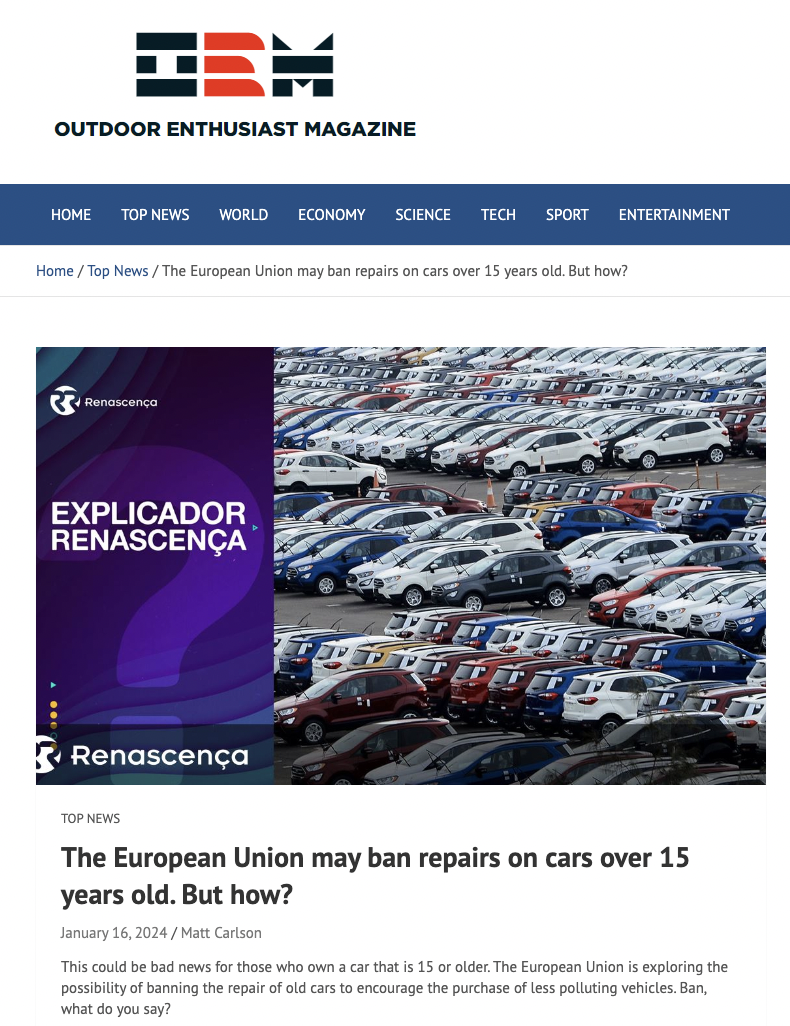
Does the European Commission propose outlawing repairs on cars over 15 years old? No, that's not true: A proposal about end-of-lifecycle vehicles does not say that. A spokesperson for the European Commission categorically refuted the claim in a conversation with Lead Stories.
The claim originated in an article (archived here) published by a website named Outdoor Enthusiast Magazine on January 16, 2024, under the title:
The European Union may ban repairs on cars over 15 years old. But how?
The article began:
This could be bad news for those who own a car that is 15 or older. The European Union is exploring the possibility of banning the repair of old cars to encourage the purchase of less polluting vehicles. Ban, what do you say?
For now, this is a proposal from the European Commission, which has not yet been approved by the European Parliament, but aims to renew the car fleet and encourage Europeans to buy new, environmentally friendly vehicles.
The Brussels proposal is based on the concept of a residual vehicle, a category for vehicles over 15 years old whose faults affect the engine, gearbox, brakes, steering, chassis or bodywork.
This is what it looked like at the time of writing:
(Source: Outdoor Enthusiast Magazine screenshot taken on Thu Mar 14 16:53:51 2024 UTC)
The article failed to provide any direct quotes or links to sources.
Adalbert Jahnz, European Commission spokesperson for environment and transport, told Lead Stories via email on March 14, 2024:
There is a lot of misinformation around about this proposal. There is absolutely nothing in it that would ban repairs of cars over 15 years of age (or any specific age).
The 2023 proposal (archived here) defines (archived here) end-of-lifecycle vehicles (ELVs) through the state of a vehicle, not its age:
The basic principle is that a vehicle shall be considered as an ELV when it is irreparable.
This principle does not apply to vehicles of historic interest , which are excluded from both the current EU legislation and are outside the scope of the new Regulation proposal.
If a car needs a repair, any part may be changed as long as the vehicle is fit to pass the roadworthiness inspections and remains authorised to operate on the EU roads. In particular, the proposed Regulation does not prohibit the repair or replacement of the engine, gearbox, shell or chassis assembly of a vehicle.
The aim of these measures is that vehicle owners who need to repair their cars, as well as repair operators, are able to find and use such spare parts more easily. These parts are generally much cheaper than new ones. The proposed measures include new requirements to facilitate the removal of spare parts from end-of-life vehicles, as well as the streamlining of digital information from manufacturers to the repair and maintenance operators.
Some European regulations do mention (archived here) 15 years as the average lifespan of a car but do so in the context of estimation, not prohibition.
Answering follow-up questions via email on the same day, Jahnz confirmed to Lead Stories:
There is no link between the average car lifespan of 15 years and anything in the proposal.
The new, stronger regulation and more traceability will ensure that only high-quality, technically fit European vehicles will be exported to consumers in 3rd countries.


















